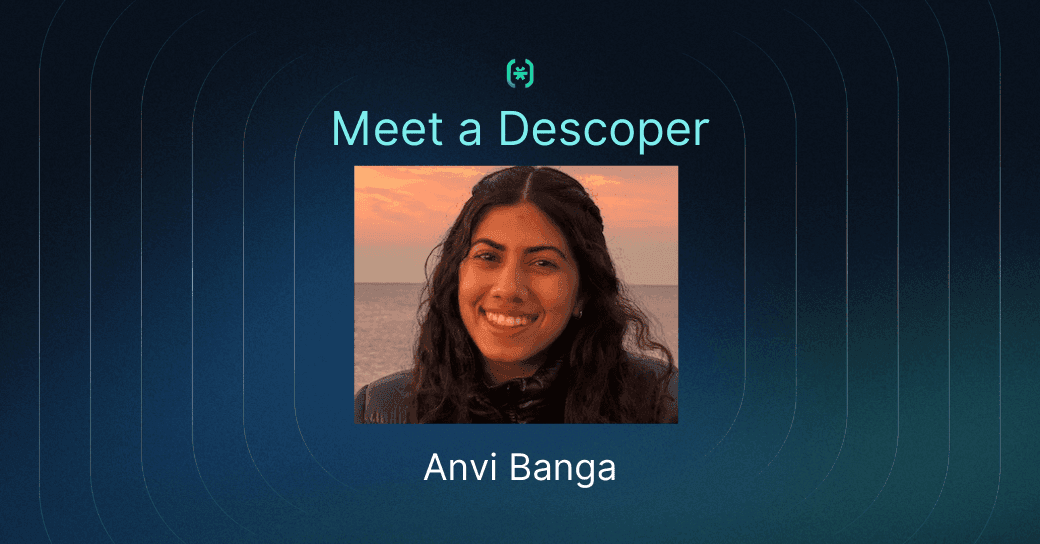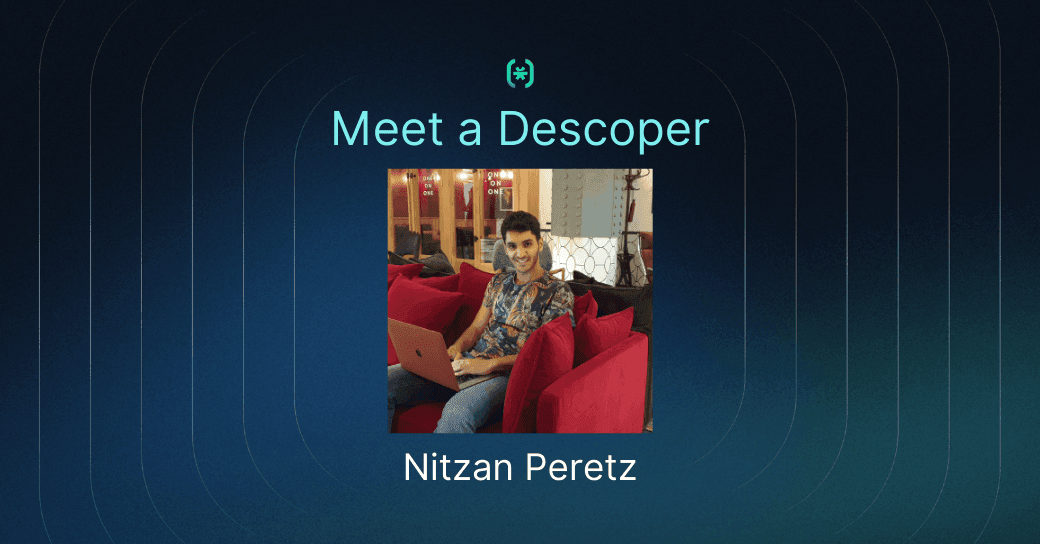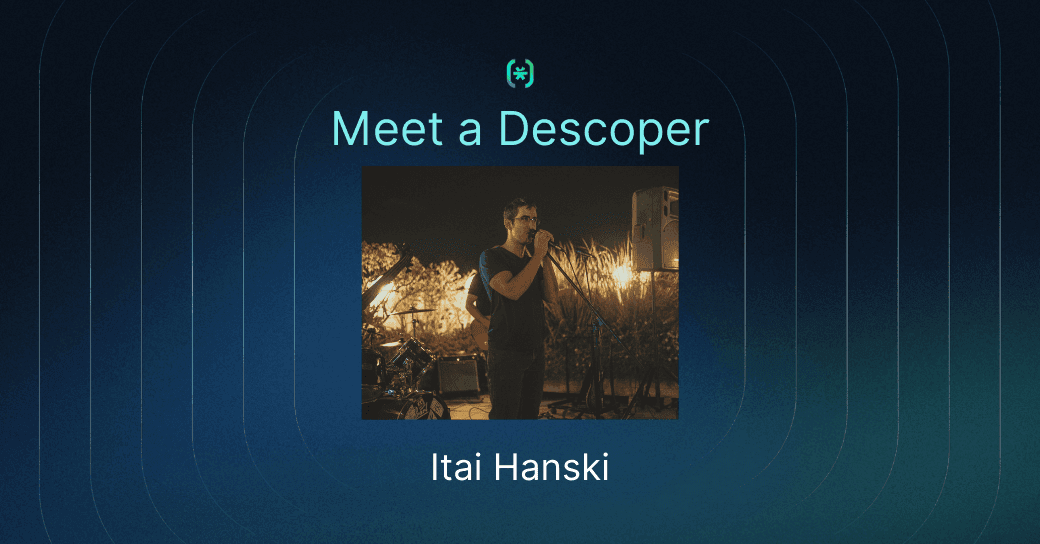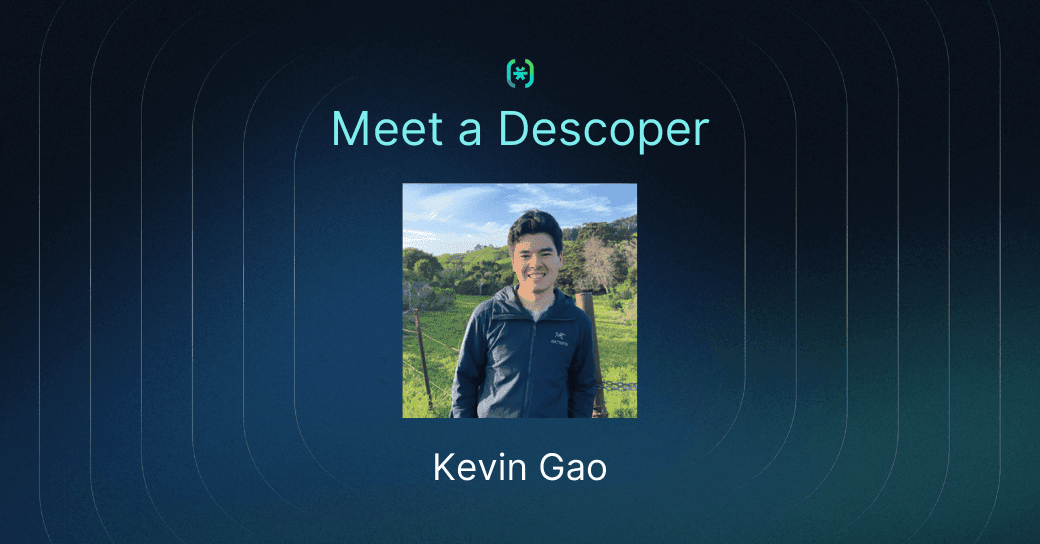Table of Contents
How I got here
Welcome to Meet a Descoper! This interview series spotlights app builders—whether they are Descope employees, community members, or users of our service. In these chats, Descopers chronicle their daily work, highlight things they are proud of, and share advice for developers wishing to pursue similar careers.
Today, we're excited to catch up with DevRel engineer Anvi Banga, who discovered that being a developer doesn't mean being chained to a desk all day. When she's not helping other developers integrate Descope authentication solutions into their apps, you might find her perfecting her squash game or creating intricate nail art designs. Take it away, Anvi!
How I got here
Q. To start off, can you tell us something about yourself?
I'm really into squash (the sport, not the vegetable) and nail art, two totally different hobbies that have become an important part of my daily routine. Squash started as a way to channel my cross-country running energy into something more social—you can't play alone, after all. And nail art has grown from a decade-long hobby into a semi-serious pursuit, complete with a spreadsheet tracking nearly a thousand polishes. Thanks to some PR partnerships via my Instagram, I even get early access to some exclusive nail products… not that I’m bragging about being obsessed (laughs).
Q. How did you decide to become a developer?
Growing up, I actually wasn't strongly grounded in what I wanted to do in my day-to-day. Honestly, I wasn't even sure what industry I wanted to be in. But I was surrounded by people in tech, and watching them work made me realize something cool: the developer mindset gives you these amazing problem-solving tools that you can apply in any area of life.
I kept seeing how their technical background let them tackle all kinds of challenges. Then it clicked that becoming a developer wasn't closing any doors, it was actually giving me more ways to approach different problems.
Q. Why did you join Descope?
I always knew I wanted something technically focused where I could use my problem-solving skills, but I also loved talking to people and getting their feedback on what I was building. The DevRel engineer role at Descope has all of those elements baked into one. What really drew me to the company was how the leadership encouraged me to explore different aspects of the role rather than pushing me into one specific lane.
And working here has totally delivered on all that promise. I love the quick back-and-forth with other developers. Like when they're trying to integrate something, and I can jump in right away with "You want this? I can help you with that!" It’s exciting and varied, and the leadership is always available for mentorship opportunities. There really is a “no such thing as a dumb question” policy in effect here.

Day in the life
Q. What’s your favorite part of your day-to-day work in the DevRel team?
You know what's funny? You say "day-to-day," but I keep waiting for there to actually be a typical workday! Every time I walk through the office doors, it’s different. I honestly keep thinking "Okay, this must be when it gets repetitive," but that other shoe just refuses to drop (laughs). And you know what? I love that. I love how I might be deep in development one moment and then switching gears to work with our customers the next.
The best part of being on the DevRel team is that we're not stuck in a traditional engineering silo. We see exactly what our customers need and can help shape solutions right away. There's this amazing sense of immediacy to everything we do.
Q. What’s one piece of work you are most proud of?
I think my work on our WordPress plugin really stands out. Everyone here definitely heard me “narrating the challenges” I was facing—definitely not complaining (laughs). It was a real test of my abilities and problem-solving skills, though. What started as a "just add one feature" project turned into a complete rabbit hole the further I went in. I had to dive deep into PHP and WordPress, both totally new to me.
But you know what they say about the greatest challenges bringing the greatest rewards? When everything finally came together—the blog post, the plugin itself, the demonstration video—it was such an amazing feeling. All three pieces were necessary to really showcase our WordPress capabilities, and seeing it all work together made those weeks of striving absolutely worth it.
Looking back
Q: What makes your approach to development unique?
When I approach any project, I try to first get really clear on the end goal. I start by asking, “What are we actually trying to achieve here?” Sometimes in development it's easy to get lost in the technical details, but I've found that being able to step back and look at the bigger picture helps keep things moving forward. This is especially valuable in DevRel, where we often need to help other developers see things from a different angle. Of course, I’m on the other side of that phenomenon just as often—as a team, we all rely on each other.
I think my writing style also reflects my candidness and desire to keep things simple. I like to be precise and get straight to the point, like in the tRPC article I wrote. It’s definitely on the shorter side, but why use fifty words when ten will do? It’s like that quote from The Office, “Why say lot word when few word do trick?” (laughs)
Q. What advice do you have for developers who are just starting their journey?
Being a developer doesn't mean being chained to your desk coding in isolation all day. That stereotype can be a real turn-off for people who are more social or creative. Here's what I've learned: development can be incredibly collaborative and varied. You just need to find the right role and the right environment that lets you be yourself.
I think the key is being honest about what actually makes you happy. Don't try to force yourself into a traditional development role if that's not your style. There are so many different ways to be a developer today, and you don’t have to pick just one.
We hope you enjoyed getting to know Anvi a little better. For more DevRel chats, authentication concept overviews, and developer tutorials, you can subscribe to our blog or follow us on LinkedIn and Bluesky.





